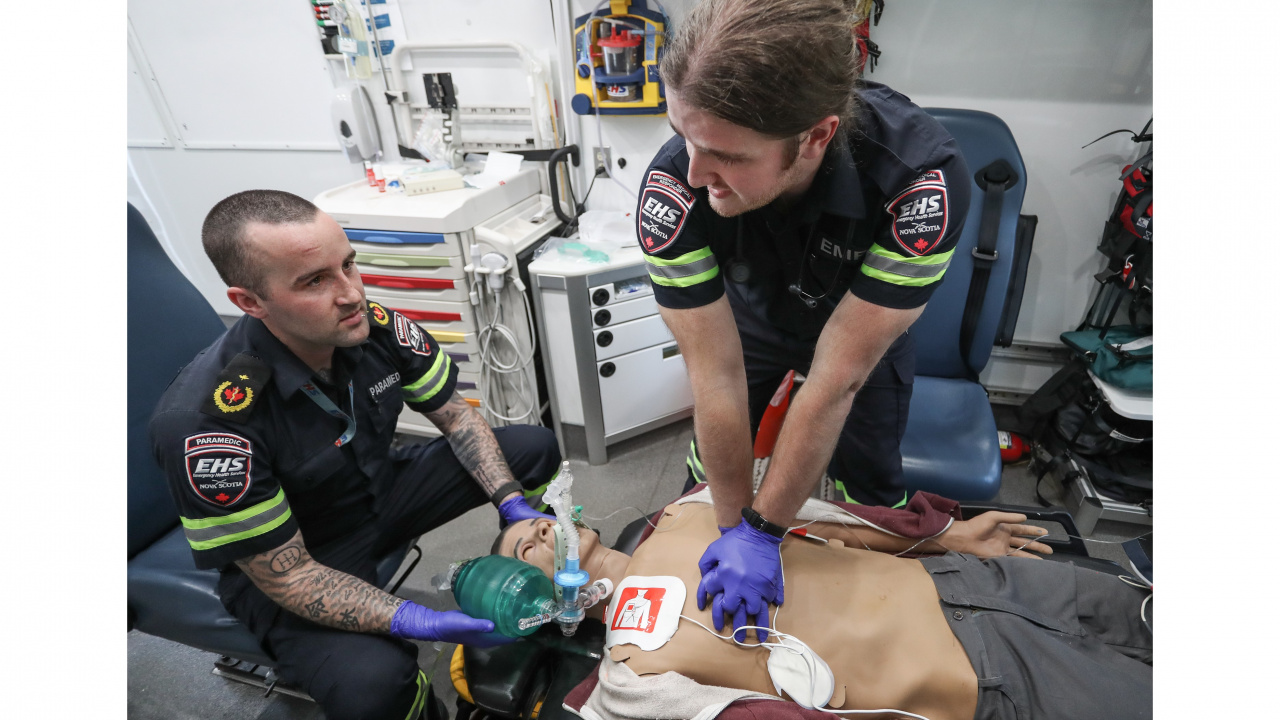Emergency Medical Responders Ready to Respond

EHS paramedic James McMaster, left, works with Max Marchand during an ambulance orientation session, part of the Emergency Medical Responder Program. Mr. Marchand is one of the program's first graduates and will join ambulance crews in a few weeks. (Communications Nova Scotia)
NOTE: Photos from an emergency medical responders’ orientation session with paramedics are available at: https://news.novascotia.ca/en/2024/06/14/emergency-medical-responder-training
Nova Scotia’s first class of emergency medical responders is ready to join the front lines and provide direct care to Nova Scotians.
Fourteen Nova Scotians, ranging in age from 19 to 60, graduated from the inaugural emergency medical responder program today, June 14. The program prepares learners to work as part of the paramedic care team.
“Today is a proud day for these graduates and for the province. Being the very first class of EMRs makes these Nova Scotians leaders and supports our efforts to transform emergency health services to deliver better care across the province,” said Brian Comer, Minister of Addictions and Mental Health, on behalf of Health and Wellness Minister Michelle Thompson. “Having these responders in the field will ensure that Nova Scotians get the right level of care, allow paramedics to work to the top of their scope and reduce wait times.”
Emergency medical responders, who have successfully become part of the emergency healthcare system in several other provinces, can assess, stabilize and transport patients to hospital. They partner with a paramedic, rather than having two paramedics staff ambulances, and this increases the number of teams available to respond to an emergency call.
Emergency medical responders can also work in teams of two, without a paramedic, in emergency department offload areas and to transfer low-risk patients who have been assessed and do not require medical care during transport. This frees up paramedics to focus on and respond to emergency calls faster.
The second class of emergency medical responders began training in May and is expected to graduate in August. Medavie HealthEd provides the training.
More information about the program is available at: https://www.medaviehealthed.com/emr/
Providing the care Nova Scotians need and deserve is a key solution in Action for Health, the government’s plan to improve healthcare in Nova Scotia.
Quotes:
“I’m so grateful for this training and the opportunity it’s provided in allowing me to be among the very first EMRs in the province. I am ready to take on the role. Knowing I can support paramedics in such a positive way and provide direct care to people is what attracted me to pursue a career in paramedicine.”
— Max Marchand, graduate, Emergency Medical Responder Program
Quick Facts:
- emergency medical responders are licensed and regulated by the Nova Scotia Regulator of Paramedicine and must pass a national exam administered by the Canadian Organization of Paramedic Regulators
- a bridging program will be developed for emergency medical responders who want to become paramedics
Additional Resources:
Action for Health, the government’s plan to improve healthcare in Nova Scotia: https://novascotia.ca/actionforhealth/
News release – New Emergency Medical Responders Will Improve Care: https://news.novascotia.ca/en/2024/01/05/new-emergency-medical-responders-will-improve-care
News release – Emergency Medical Responders Start Program: https://news.novascotia.ca/en/2024/03/12/emergency-medical-responders-start-program